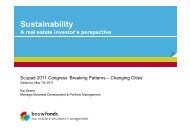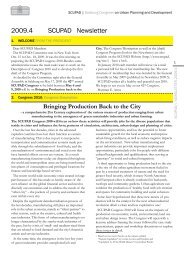Presentation - SCUPAD
Presentation - SCUPAD
Presentation - SCUPAD
You also want an ePaper? Increase the reach of your titles
YUMPU automatically turns print PDFs into web optimized ePapers that Google loves.
Salzburg Congress on Urban Planning & Development<br />
9-12 May 2013<br />
The role of economic intelligence in<br />
spatial strategies<br />
Ania Ankowska & Dr Lee Pugalis<br />
Northumbria University, UK
Overview<br />
• topic introduction – innovative concept<br />
• Attempt to conceptualise the Local Economic Assessments (LEAs)<br />
process & identification of the prospective policy development<br />
opportunities<br />
• Future of economic assessments in the era of austerity<br />
• LEAs and LEPs (Local Enterprise Partnerships) interface<br />
• utilization of LEAs& future of LEAs<br />
• importance of the topic & relevance to the theme of the congress
BACKGROUND<br />
• Local Economic Assessments (LEAs) – a statutory duty on all<br />
English principal local authorities<br />
• LEAs were part of a much broader ‘review’ of sub-national<br />
development initiated in 2007<br />
• Change in government in 2010 led to a change in ethos<br />
• hands off approach - removal of the statutory guidance:<br />
‘unnecessary central interference that goes against the grain<br />
of localism’<br />
• Local Enterprise Partnerships (LEPs) – 39 established; publicprivate<br />
partnerships
METHODOLOGY<br />
• Developed prior empirical research by Pugalis<br />
• National policy analysis<br />
• Research Setting: Local authorities, governance entities and<br />
partnerships in the North East of England<br />
• Data collection took place during the summer and autumn of<br />
2012<br />
• 18 semi-structured interviews were conducted with key<br />
participants including local authority officers
THE NORTH EAST OF ENGLAND<br />
• The lowest GVA per capita in England<br />
• Faces structural economic issues and concentrated areas of<br />
deprivation but it does have some sectoral strengths e.g. advanced<br />
manufacturing
WHAT IS THE SCOPE & PURPOSE OF LEAS?<br />
• It is an umbrella term – can cover economic reviews, economic<br />
masterplans, impact evaluations etc<br />
• Multidimensional scope and purpose and the utility across<br />
various disciplines tailored to the individual needs of localities<br />
• Analytical tool which gathers together all the information and<br />
describes local economy, helping to set the targets and the<br />
benchmarks<br />
• Extraordinary in form and scope<br />
• A form of economic intelligence to help inform spatial strategies
APPROACH TO THE PRODUCTION OF LEAS<br />
• Some standard methods but tailored to local circumstances<br />
• A multi-tiered approach was implemented in some cases:<br />
- partnership with various consultants within across a range of fields<br />
- doing all work in-house<br />
- amalgamation of both<br />
• General approach including the guidelines and the assessment<br />
would be helpful in assessing the current progress and setting the<br />
future goals
LEAS & LEPS INTERFACE<br />
• LEPs: cross-boundary public-private strategic local growth<br />
arrangements<br />
• Striking similarities of focus between LEPs and LEAs<br />
• The interface between the analytical processes (in the form of LEAs)<br />
and the governance networks (referring to LEPs) is often<br />
disconnected<br />
• The interaction between these analytical processes and governance<br />
networks has not been as fruitful as it could be<br />
• the enhanced cooperation LEAs- LEPs can yield better results for the<br />
sake of economic growth
UTILIZATION OF LEAS & FUTURE OF LEAs<br />
• the exercise has been useful in many ways<br />
- helping to draw strategies<br />
- highlighting a range of actions<br />
- forming the evidence base for corporate plans, local development<br />
framework<br />
- has illuminated the important areas of understanding<br />
• the statutory duty has gone beyond the initial gloomy presumptions<br />
• a belief that the processes of LEAs must be continued in the future in<br />
various forms (regular updates / plans to periodically re-visit the work/<br />
production of a kind of life live bank) exist<br />
• LEAs need to constantly demonstrate their value in the form of being<br />
unremitting evidence
POLICY DEVELOPMENT OPPORTUNITIES<br />
• the statutory duty was not simply something that had to be done<br />
per se.<br />
• embarking on that time-consuming and expensive exercise was<br />
‘inevitable despite high costs’.<br />
• the high cost of LEAs production has been justified by practical<br />
value<br />
• LEAs are crucial as the current conditions of the country’s<br />
economy determine the future policy and the potential prospects<br />
for growth<br />
• the permissive approach is regarded not to be flawless but it is<br />
believed to be the best option in the current economic milieu












